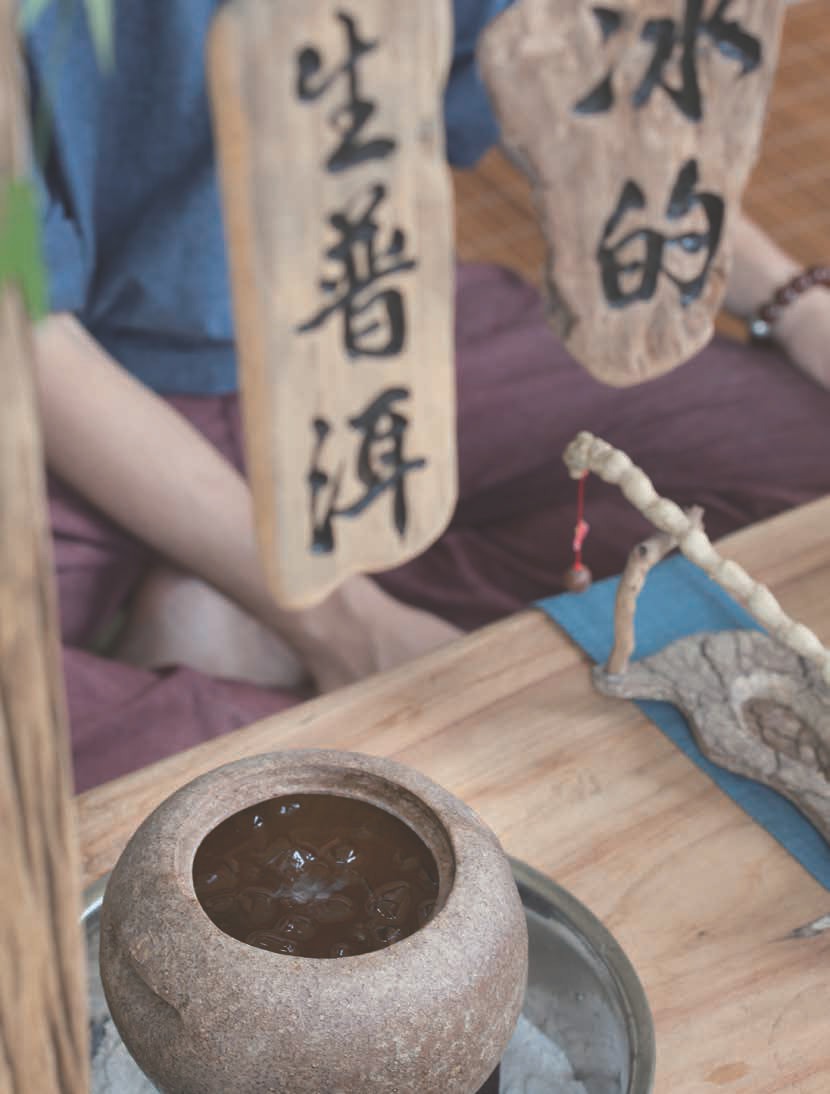
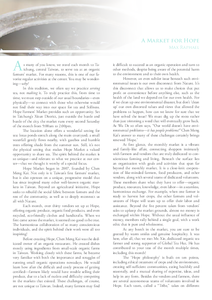 |
|

As many of you know, we travel each month to Taichung, central Taiwan, to serve tea at an organic farmers' market. For many reasons, this is one of our favorite regular activities at the center. You may be wondering - why?
In this tradition, we often say we practice serving tea, not making it. To truly practice this, from time to time, we must step outside of our usual boundaries - even physically - to connect with those who otherwise would not find their way into our space for tea and Stillness. Hope Farmers' Market provides such an opportunity. Set in Taichung's Xitun District, just outside the hustle and bustle of the city, the market runs every second Saturday of the month from 9:00am to 2:00pm.
The location alone offers a wonderful setting for tea: lotus ponds stretch along the main courtyard; a small waterfall gently flows nearby, with gazebos and humble trees offering shade from the summer sun. Still, it's not the physical setting that makes Hope Market a valued opportunity to share tea. The spirit behind the market is so unique - and relevant to what we practice at our center - that we thought it worthy of a special focus.
Hope Market began in 2007, founded by Chen Meng Kai. Not only is it Taiwan's first farmers' market, but it also operates on a unique, progressive model that has since inspired many other well-known organic markets in Taiwan. Beyond an agricultural initiative, Hope seeks to rebuild the social fabric between farmers and the rest of the community, as well as to deeply reconnect us all with Nature.
Each month, over thirty vendors set up at Hope, offering organic produce, organic food products, and even recycled, eco-friendly clothes and handicrafts. When we first came across the market, it seemed too good to be true. The harmonious collaboration of so many conscientious individuals, and the spirit behind their work were all too inspiring!
Before creating Hope, Chen Meng Kai was the dedicated owner of an organic restaurant. He created dishes mostly using ingredients from small-scale organic farms in Taiwan. Working closely with these farms, he became very familiar with both the importance and struggles of running small organic operations nowadays. He would learn how after the difficult and costly process of getting certified - farmers likely would have trouble selling their produce, due to a lack of outlets and difficulty competing in the markets that existed. These challenges, of course, are not unique to Taiwan. Indeed, many farmers may find it difficult to succeed as an organic operation and turn to other methods, despite being aware of the potential harm to the environment and to their own health.
However, an even subtler issue beneath such environmental issues is our own disconnect from Nature. It's this disconnect that allows us to make choices that put profit or convenience before anything else, such as the health of the land we depend on for our own health. For if we clean up one environmental disaster, but don't 'clean up' our own distorted values and views that allowed the problems to happen, how can we know for sure that we have solved the issue? We must dig up the roots rather than just trimming a weed that will eventually grow back. As Wu De so often says, "Our world doesn't have environmental problems - it has people problems!" Chen Meng Kai's answer to many of these challenges certainly brings renewed 'Hope.'
At first glance, the monthly market is a vibrant and family-like affair, connecting shoppers intimately with farmers and vendors that are truly dedicated to conscientious farming and living. Beneath the surface lies an organization with goals and activities that span far beyond the monthly market. It is a close-knit cooperation of like-minded farmers, food producers, and other vendors, along with several teams of dedicated volunteers. These members share what they have to offer - organic produce, resources, knowledge, even labor - in a seamless, harmonious exchange. For example, when one farmer is ready to harvest her crops, the other farmers and volunteers of Hope will team up to offer their labor and assistance. Beyond the five percent taken from vendors' sales to upkeep the market grounds, almost no money is exchanged within Hope. Without the usual influence of money, members rally behind a single goal, with a work ethic that is pure and wholesome.
At any booth in the market, you are sure to be greeted by warm smiles and genuine hospitality. It was here, after all, that we met Mr. Xie, dedicated organic tea farmer and strong supporter of Global Tea Hut. He has contributed to your teas of the month multiple times, including this month!
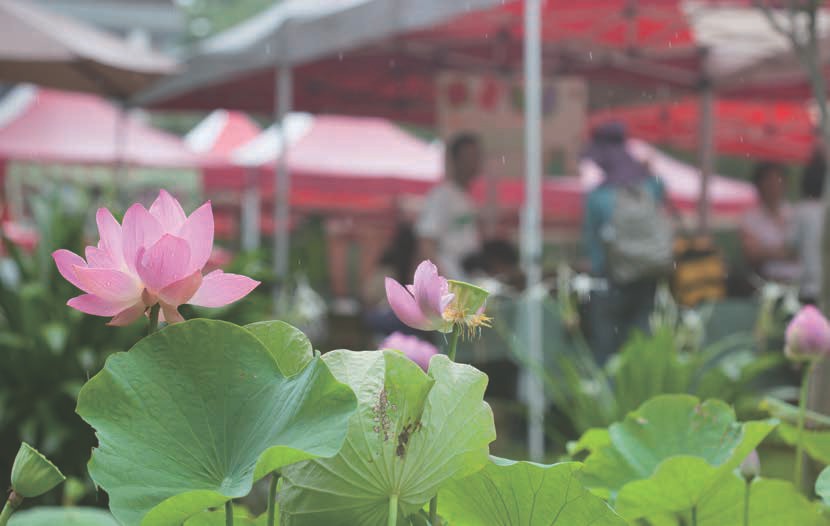
The 'Hope philosophy' is built on ten points, including ethical treatment of crops and the environment, creating self-sufficient communities, eating healthily and seasonally, and a mutual sharing of expertise, ideas, and help in any form. Besides the vendors and farmers, there are several autonomous teams of volunteers involved in Hope. Each team, called a "Tribe," takes on different responsibilities or projects, from organizing farm field trips for the public, to developing new processing or packaging methods for the farmers' produce. For potential volunteers and vendors alike, Hope carefully screens candidates, even requiring several classes and an interview to become a volunteer. With such a close-knit operation, Mr. Chen and his team ensure that one's overall approach and beliefs align with the overall organization.
Between the monthly farmers' markets, members are constantly meeting at the Hope Education Center in Taichung to share farming knowledge and techniques, ideas for new projects, or simply, a meal and some hospitality. Each week, "Tuesday Salons" are also held at their center. At these events, a different vendor or farmer will hold a workshop for Hope members and the public, sharing their unique expertise with the community. Classes might range from organic farming science to a workshop on making miso. Before each class, a dinner is cooked onsite using fresh produce provided by the different farmers.
Within moments of stepping onto the peaceful courtyard, this same camaraderie of Hope Market can be clearly felt. Vendors and volunteers alike are constantly moving around the grounds, helping each other set up each morning. Later in the day, different farmers will visit our stall, sometimes gifting us with a bundle of vegetables or a large bag of bee pollen, firmly refusing any repayment!
By striving to improve organic farming methods and promote ethical, eco-friendly products and projects, Hope Market is making great outward strides in healing the world and our connection to it. However, we shouldn't overlook the connection inward, which we mentioned earlier. This alignment with the truth of our own hearts is needed just as much today as it ever was before. This is what our humble tea stall can offer to the market - inner harmony with Nature to correspond to all the outer work they do. You could say we provide the spiritual medicine while the other stalls heal the physical.
Looking out past the table on which we serve tea, Hope Market indeed looks like an enchanting world. Strolling along the lotus ponds, buyers visit one vendor's stall after the next, interacting face to face with honest farmers and bright smiles. Children idly play near the waterfall before enjoying a bowl of healthy, nourishing food cooked onsite by community members.
While giving off a strong communal and family-like vibe, it is of course still a market! Vendors are working hard to sell their goods to patrons to earn their livelihood; busy mothers are juggling bags of produce while trying to keep an eye on their children. The truth is, even when many of us go to shop at our favorite farmers' market on the weekend, sometimes we find that we cannot fully enjoy it. We are still pulled this way and that - perhaps our child is also tugging us in the direction of the ice cream vendor. Even in this cheerful environment, we can lose ourselves. Sitting down for a bowl of tea, one may find a bit of stillness. Sometimes this stillness is shared over one or two bowls of tea; other times, a guest might drop his or her Saturday afternoon plans, and stay for two hours. Sometimes people are talkative, eager to learn more about our center or about tea. Other times, not much is said at all, and tea is shared in a silence that diminishes even the hubbub of the market surrounding us.

In any of these moments, we are simply being Here, holding space, offering connection in our own way. As Chajins, facilitating this moment is one of the most important aims for our tea. Through the simple act of sharing tea, we once again remember the simplest gifts - that we are breathing, we are alive, sharing this moment together for the first time. All of the conditions for joy are already here and now. In this way, even though we share so many ideas and beliefs with the other farmers and vendors at the market, we can benefit the market by standing out in one unique way: our agenda is to share tea, and nothing else. We do not aim to promote our center, ask for donations, or even to engage in discussions about tea!
Our 'roadside tea stall' indeed resembles the one that Baisao the tea seller set up to share tea with passersby - a huge improvement from our previous arrangement of preparing tea on the ground. Our welcoming tea stall communicates our offering perfectly. Made of found antique wood, the stall has an earthy, natural feel. Carved, painted signs hang from a piece of aged bamboo above, indicating the tea we are serving on a given day. Sharing organic, living tea with our guests is our way to facilitate connection with Nature, others and with ourselves.
Whether serving tea to the public or to our closest friend or partner; whether indoors or in Nature, it is important that our guests feel comfortable. Hopefully without any instruction, they silently know how to connect with the session. Since the atmosphere of Hope Market is already welcoming and open, guests often settle into the tea experience quite naturally. Sitting across from us at our new tea stall, there is no question of "what" we are doing at the market. However, one question that some people may still ask is "why?"
With charcoal, mountain water and oldgrowth leaves we sit and serve tea simply and freely from bowls. There is no aim in erecting our roadside huts, other than to offer a bit of calm space and a pause for tea in a bustling world. Our work is pure and simple, unadorned and non-sectarian. We aren't preaching any philosophy or theory, nor promoting any technique or tradition. We aren't offering anything more than a warm smile, friendship and loving-kindness through a bowl of tea and the accompanying calm.
With this in mind, Hope Market is such a fitting place for such service, as our approach to tea is so similar to Chen Meng Kai's approach to the market: to re-establish the intimate link between humans and nature, and between people themselves. Certainly, people connect at Hope Market. The farmers and vendors connect with the public, making friendships along with sales. The community becomes more connected under the umbrella of a greater purpose.
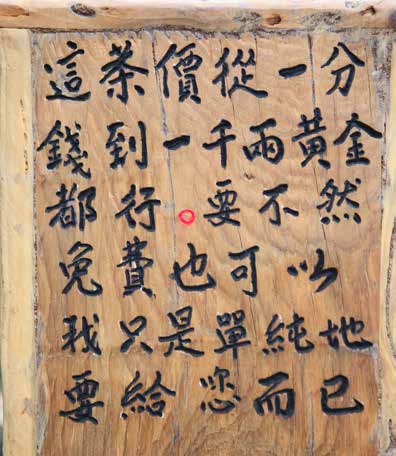
Just this past month, we served iced tea for the first time at the market. Our kama, usually used to heat boiled tea, was filled with ice, over which we poured freshly sun brewed sheng puerh. (You can read more in-depth about sun-brewed tea in this current issue).
The gentle, cooling energy found in each bowl offered a penetrating calm amidst Taiwan's intense summer heat and humidity. In the same way that organic fruits and vegetables purify our bodies, we hope to refresh people spiritually - to ground them in this moment, in their very hearts.
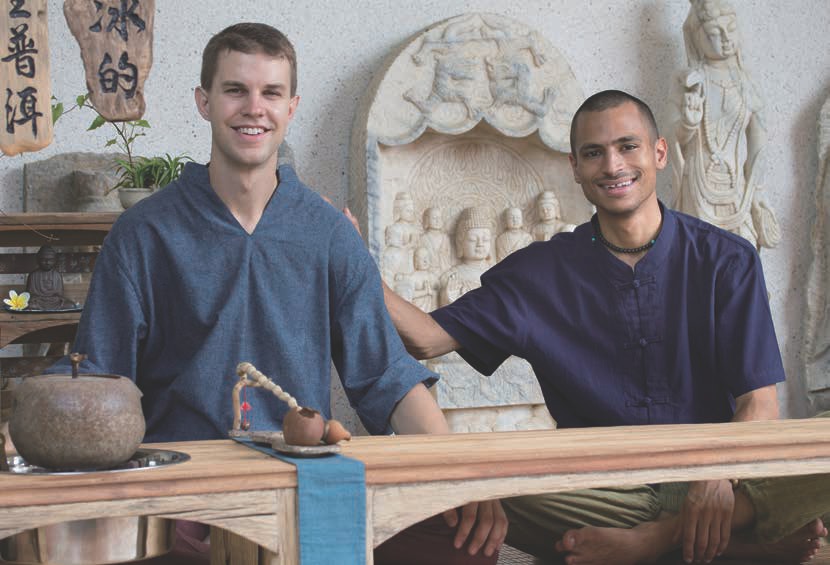
As we become more eco-conscious overall, the words "connection to Nature" frequently come up. Of course, this suggests a deeper understanding of where our food comes from, and treating the Earth with greater care. However, from the view of our Tea Tradition, there could be an additional meaning of "connecting to Nature." This involves a nonverbal recognition of Nature, and all its qualities, already existing within us. Drinking tea more and more with our entire being, we can come to experience this deeply for ourselves.
Not every place we travel to serve tea facilitates this connection in such an unobstructed way. This is what makes Hope Market special. Serving tea here reminds us of the greater purpose behind healing our disconnect with Nature, and the deeper spirit of our practice of tea.

We do not inherit the Earth from our Ancestors, we borrow it from our children.
